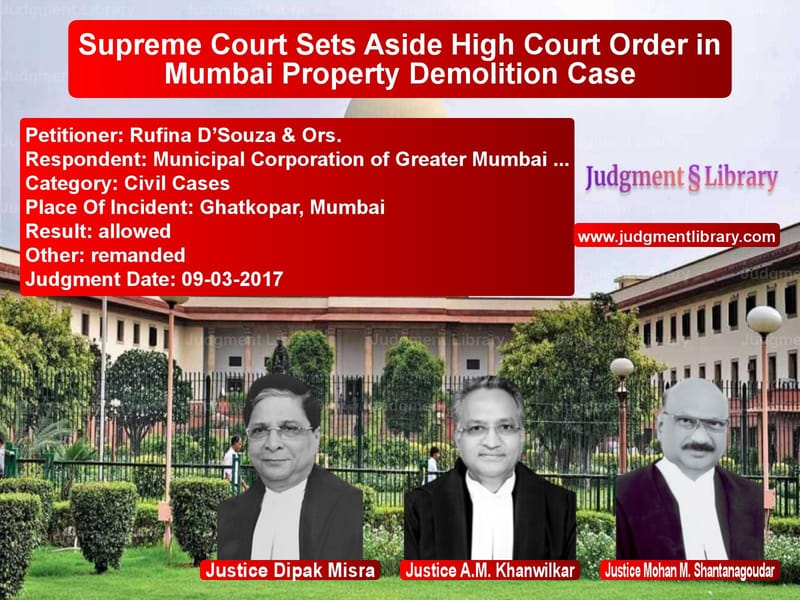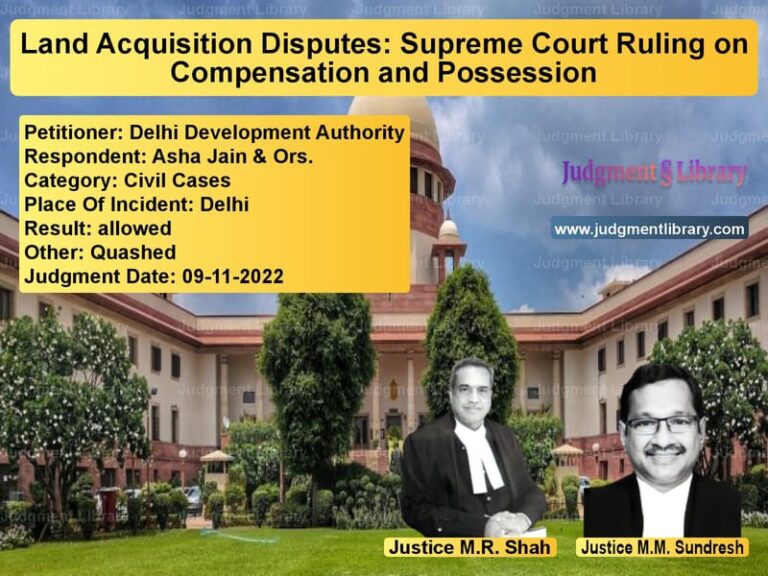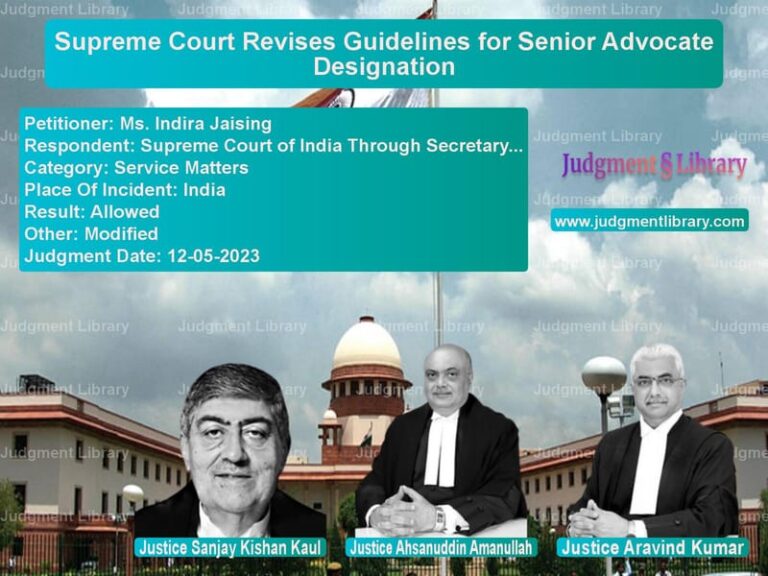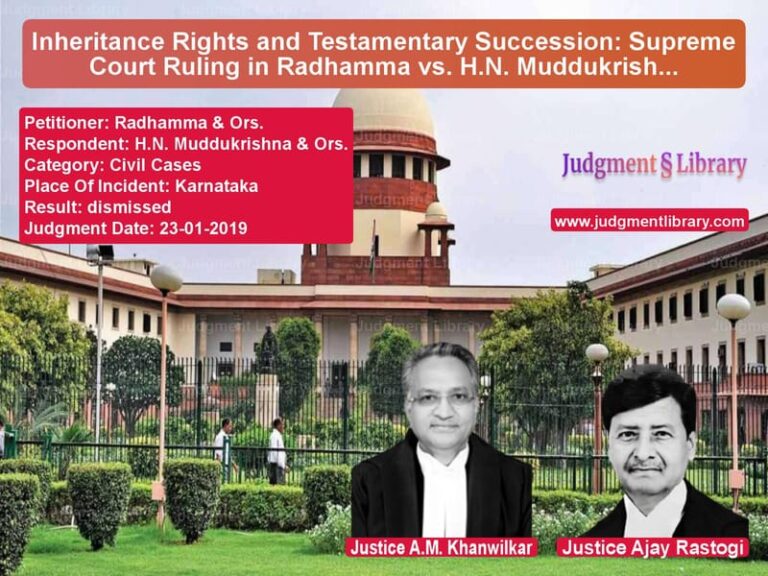Supreme Court Sets Aside High Court Order in Mumbai Property Demolition Case
The case of Rufina D’Souza & Ors. vs. Municipal Corporation of Greater Mumbai & Ors. is a landmark judgment concerning the demolition of allegedly dilapidated buildings and the rights of occupants. The Supreme Court overturned the Bombay High Court’s decision, emphasizing the necessity of judicial review before executing demolition orders.
Background of the Case
The dispute arose when the Municipal Corporation of Greater Mumbai (MCGM) issued a demolition notice for J.D. House, a building located in Ghatkopar, Mumbai. The petitioners, including Rufina D’Souza, who occupied tenements in the building, challenged the notices, claiming that due process was not followed.
Key developments:
- The MCGM issued a notice on November 18, 2014, declaring J.D. House as a dangerous building under Category C-1 (requiring immediate demolition).
- Another notice was issued on August 9, 2016, for disconnection of water and electricity to enforce the demolition.
- The petitioners filed a writ petition before the Bombay High Court, which was summarily dismissed on January 13, 2017, stating that the matter involved disputed facts best resolved in civil suits.
- The petitioners then appealed to the Supreme Court, seeking protection from eviction and challenging the legality of the demolition orders.
Legal Issues Before the Supreme Court
- Was the MCGM’s demolition notice legally valid?
- Did the Bombay High Court err in dismissing the writ petition without a detailed hearing?
- Were the occupants given a fair opportunity to contest the demolition?
Arguments by the Petitioners (Rufina D’Souza & Others)
The petitioners contended:
- The demolition order was arbitrary and lacked proper assessment.
- They were not given adequate time or an opportunity to challenge the building’s classification as ‘dilapidated.’
- The High Court dismissed the case without considering their fundamental rights under Article 226 of the Constitution.
- The disconnection of water and electricity was a coercive measure without legal justification.
Arguments by the Respondents (Municipal Corporation of Greater Mumbai)
The MCGM argued:
- The building was in a structurally unsafe condition, posing a threat to public safety.
- The classification under Section 354 of the Mumbai Municipal Corporation Act, 1888, was based on expert assessments.
- The petitioners had legal remedies available through civil suits and could not invoke writ jurisdiction.
Supreme Court’s Observations
The Supreme Court criticized the High Court’s approach, stating:
“The High Court has not even touched upon the core issues raised by the appellants concerning the challenge to the impugned notices.”
The Court further held:
“The fact that a suit for specific performance was pending between private parties cannot be a tangible reason to decline to examine the grounds of challenge put forth by the writ petitioners.”
Final Judgment
On March 9, 2017, the Supreme Court ruled:
- The appeal by Rufina D’Souza & Others was allowed.
- The Bombay High Court’s judgment was set aside.
- The writ petition was remanded to the High Court for a fresh hearing.
- Interim relief granted by the Supreme Court (preventing demolition) would continue until the High Court made a final decision.
Legal Implications of the Judgment
This ruling establishes key principles:
- Judicial Review: High Courts must thoroughly examine government demolition orders.
- Fundamental Rights: Property occupants must be given a fair hearing before eviction.
- Legal Remedies: Writ jurisdiction is valid when statutory rights are at stake.
Impact on Future Property Demolition Cases
This judgment sets a precedent:
- Municipal authorities must justify demolition notices with proper evidence.
- Courts must ensure affected individuals are given due process.
- Litigants can challenge arbitrary demolitions through writ petitions.
Conclusion
The Supreme Court’s decision in Rufina D’Souza & Ors. vs. Municipal Corporation of Greater Mumbai & Ors. reinforces the principle that governmental authorities cannot arbitrarily demolish properties without giving affected individuals a chance to be heard. The ruling ensures that procedural fairness is upheld and that High Courts conduct meaningful judicial reviews in similar cases.
Don’t miss out on the full details! Download the complete judgment in PDF format below and gain valuable insights instantly!
Download Judgment: Rufina D’Souza & Ors vs Municipal Corporatio Supreme Court of India Judgment Dated 09-03-2017.pdf
Direct Downlaod Judgment: Direct downlaod this Judgment
See all petitions in Property Disputes
See all petitions in Landlord-Tenant Disputes
See all petitions in Specific Performance
See all petitions in Judgment by Dipak Misra
See all petitions in Judgment by A M Khanwilkar
See all petitions in Judgment by Mohan M. Shantanagoudar
See all petitions in allowed
See all petitions in Remanded
See all petitions in supreme court of India judgments March 2017
See all petitions in 2017 judgments
See all posts in Civil Cases Category
See all allowed petitions in Civil Cases Category
See all Dismissed petitions in Civil Cases Category
See all partially allowed petitions in Civil Cases Category







